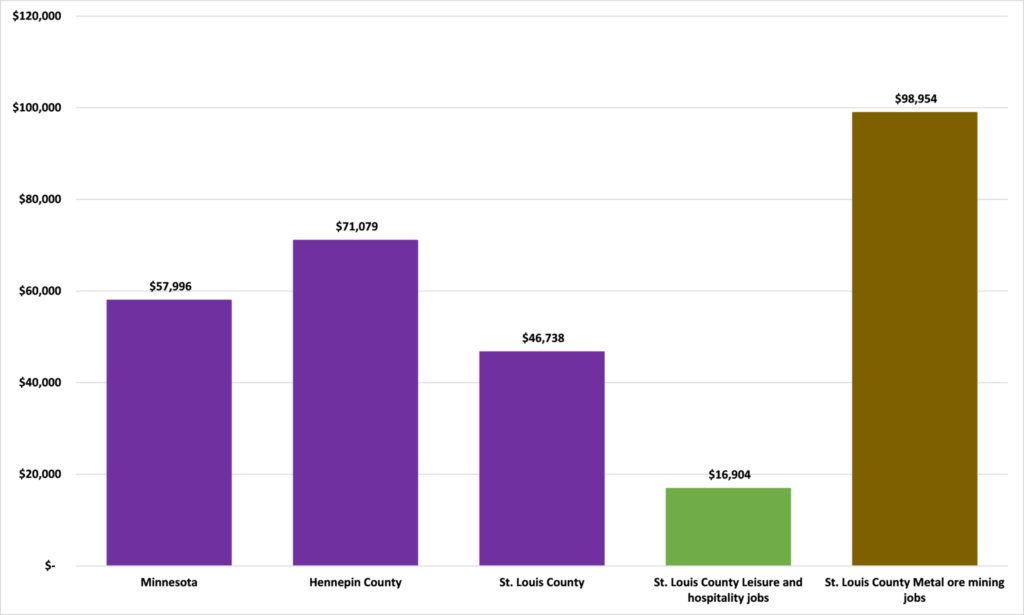Metro To Miners: You’ll Have to Do Something Else
A recent story in Politco entitled “Minnesota on the edge: ‘I’ve voted Democrat my whole life. It’s getting tougher,” details how the political leanings of Minnesotans on the Iron Range, who had traditionally leaned toward the DFL, are beginning to shift. The shift is occurring because a significant number of people living on The Range feel that the party has become more focused on its urban constituency, which has lost touch with the pro-labor, pro-mining constituencies on The Range.
Energy and environmental issues are at the forefront of the diverging interests of urban liberals and blue-collar workers up North. Urban greens, like St. Paul Congresswoman Betty McCollum, oppose developing Minnesota’s vast copper-nickel resources even though doing so could create more than 4,600 of high-paying jobs in the mining industry and support more than 10,000 more jobs in support industries and in the greater economy as miners spend their paychecks at hospitals, grocery stores, and car dealerships.
Residents up North are eager to develop these resources in an environmentally responsible manner because these jobs bring new opportunity and hope to the area. Local residents hope the high wages jobs will help them make a better life for their families, and local governments and school districts are eager to reap the tax revenues and increases in enrollment that accompany new infusions of money into the region.

The Politco piece captures this friction well:
“Many jubilant residents of Ely and nearby towns are now hanging their hopes on a plan to build a massive mining facility under a patch of national forest that’s a stone’s throw from one of the most verdant watersheds in the world. But the project increases the risk of acidic waste contaminating the area’s lakes and streams. Environmental groups mounted a well-funded push against the project. Democratic presidential contenders began objecting, too: Bernie Sanders, Mike Bloomberg and Elizabeth Warren pledged to stop the project. Joe Biden has yet to take a position.
And that’s forced people in Ely and Minnesota’s Iron Range region to think again about who are its protectors and defenders.”
The disconnect is growing because issues like mining are bumper sticker issues in the Twin Cities, but on The Range, mining is a kitchen table issue because it is literally how many of its residents put food on their tables. Insult is added to injury when mining opponents in the metro unironically slap a sticker on the back of their car signalling their opposition to mining in our state, while failing to understand that their car is made from iron, copper, and nickel, and these materials didn’t materialize out o thin air. They were mined.
People on The Range, however, are painfully aware of the empty storefronts on Main Street, fewer kids at the local school district, and they know that this is partially due to the fact that they cannot access the billions of dollars in wealth that are right beneath their feet.
The divide is growing wider, too, as generational ties that had once connected urban liberals to family members who worked in the mines or lived up North are fading. In the Politico interview, Chris Johnson, the President of the United Steelworkers Local 2705 union, discussed his meeting with Minneapolis Congresswoman Ilhan Omar, who has endorsed policies like the Green New Deal. The article states:
“The environmental priorities of Democrats at the national and state levels are shifting support in places like the Iron Range, where even pro-labor members feel increasingly alienated by a platform more suited to a political party that is rapidly becoming more urbanized.
Johnson recounted a meeting last year in Washington with Rep. Ilhan Omar, a Democrat from Minneapolis. He said the lawmaker told him the way of life in the Iron Range is going to change.
“We’re a vital part of all products made in this country and abroad and for her to just sit there and say, ‘Look you guys are going to have to learn a different industry,’ doesn’t go over well,” he said.”
It makes perfect sense that Ms. Omar would not have ties to The Iron Range or the mining industry, but one can hope that she would be more open minded about the industry and the important role it plays in the regional economy of Northeastern Minnesota. Mining jobs are good jobs. With annual average wages near $100,000, they are the kind of jobs that allow people to work hard, save money, help their kids through college, and enjoy retirement.

Given this understanding, it is no surprise that Iron Rangers are beginning to look for alternatives:
“When you get some of the radicals in the state Democratic Party trying to push the environmental agenda a little too far, that’s when people are going to push back,” said Jon LaMusga, a salaried mine worker who supported Trump in the last election.